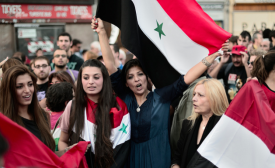syria
Judging by 2014's crowded election calendar, this will be a landmark year for democracy. The Economist estimates that an unprecedented 40 percent of the world’s population will have a chance to vote in national polls in 2014. We'll see races in populous countries such as Brazil, Indonesia, the United States, and, most notably, India, where 700 million people are expected to cast ballots in what Fareed Zakaria has called the “largest democratic process in human history.”
It is an absolute certainty that 2014 will be a turbulent year for the United Nations. The organization is struggling with crises ranging from the chaos in the Central African Republic (CAR) to the plight of Syrian refugees. There is little hope that these challenges will dissipate soon. Yet two sets of peace talks this month could well decide whether the U.N. faces a truly dreadful year ahead, or just a very difficult one.
The Vatican announced Tuesday it would host a workshop early in the new year to brainstorm peaceful solutions to the ongoing civil war in Syria.The Vatican has invited leading figures including former British Prime Minister Tony Blair and Mohamed ElBaradei, the Egyptian former head of the International Atomic Energy Agency, to brainstorming sessions on Jan. 13.
The United States announced recently that it was suspending aid to the rebels fighting to overthrow the regime of Syrian President Bashar al-Assad. This comes amidst reports that other Western countries are now gradually withdrawing their military support to the rebel forces. Should the suspension of U.S. assistance be made permanent?
When Qatar’s royal family was looking for advice on charitable giving, it turned to a well-regarded professor named Abd al-Rahman al-Nu’aymi. The 59-year-old educator had a stellar résumé that included extensive fundraising experience and years of work with international human rights groups.
Besides goodwill, another major motivation behind humanitarian assistance is exerting influence. Influence can emerge through cultural, economic, or political means. Political means seeking to resolve a conflict through humanitarian assistance and institutions practicing humanitarian efforts can be identified as ‘humanitarian diplomacy’.

Besides goodwill, another major motivation behind humanitarian assistance is exerting influence. Influence can emerge through cultural, economic, or political means. Political means seeking to resolve a conflict through humanitarian assistance and institutions practicing humanitarian efforts can be identified as ‘humanitarian diplomacy’.
Wittingly — or perhaps unwittingly, because of the rapid acceleration of events — Hezbollah’s opponents have not shed much light on the latest major positions expressed by Secretary-General Hassan Nasrallah in his Dec. 3 interview on Lebanon's OTV. Lebanese cultural and intellectual circles, however, are preoccupied with two issues raised by unprecedented assertions by Nasrallah. One issue is external, involving Hezbollah and Iran’s vision of the United States, while the other concerns the Shiite organization’s vision of Lebanon as a nation and a state.







